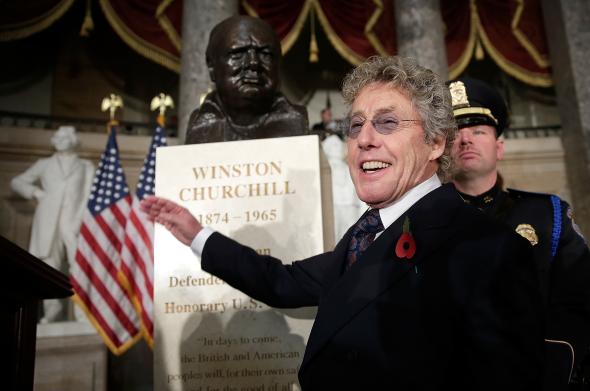Rand Paul and the Alternate History of World War II

Photo by Win McNamee/Getty Images
Jennifer Rubin, a Washington Post blogger/columnist who has never pretended to be a fan of Rand Paul, got her hands on a 2012 (vertical!) video of Rand Paul answering a question about sanctions on Iran. Paul mused a little about the mistakes America made before the outbreak of World War II.
"There are times when sanctions have made it worse," Paul said. "Leading up to World War II, we cut off trade with Japan. That probably caused Japan to react angrily. We also had a blockade on Germany after World War I that probably encouraged some of their anger."
Aaron Blake reached out to Paul's spokesman (and former chief of staff) Doug Stafford, who nipped the controversy at its stem: "The megalomaniac Hitler was to blame for the war and the Holocaust." But where did the nano-gaffe come from? The idea behind it, the idea that America supported lunkheaded blockades that angered the Nazi state needlessly, is pretty mainstream within the paleoconservative community. The Ludwig von Mises Institute, which employs old-time Ron Paul ally Lew Rockwell and frequent Ron Paul literary collaborator Tom Woods, has published several pieces advancing the argument. Here's Ralph Raico reviewing a book on the subject of the post-World War I hunger blockade.
Besides the direct effects of the British blockade, there are the possible indirect and much more damaging effects to consider. A German child who was ten years old in 1918, and who survived, was twenty-two in 1930. Vincent raises the question of whether the miseries and suffering from hunger in the early, formative years help account to some degree for the enthusiasm of German youth for Nazism later on. Drawing on a 1971 article by Peter Loewenberg, he argues in the affirmative.
Here's Adam Young in a 2004 piece criticizing a euology that George W. Bush gave for Churchill.
Churchill was instrumental in establishing the illegal starvation blockade of Germany. The blockade depended on scattering mines, and classified as contraband food for civilians. But, throughout his career, international law and the conventions created to limit the horrors of war meant nothing to Churchill. One of the consequences of the hunger blockade was that, while it killed 750,000 German civilians by hunger and malnutrition, the youth who survived went on to become the most fanatical Nazis.
And here's David Gordon in a 2008 review of Nicholson Baker's Holocaust book.* After running through the World War I blockade story, he further impugns Churchill for the pre-World War II hunger blockade.
[It] is hardly surprising that the renewed outbreak of world war in September 1939, which returned Churchill to the British cabinet as First Lord of the Admiralty, brought a new hunger blockade of Germany. Herbert Hoover strongly protested: was it really an acceptable tactic of war to starve innocent women and children? Churchill was unmoved and retained the blockade in place... Churchill rejected all efforts to reach a settlement. He continued the hunger blockade, a move that could only exacerbate the most extreme Nazi policies.
At no point do any of these authors blame America for the crimes of Nazi Germany. And neither did Paul. All that's revealed in this incident is that Paul is conversant with the work of paleolibertarian histories. That's probably enough to terrify the people who'd prefer a hawk atop their 2016 ticket.
*I originally called "Human Smoke" a novel, but it wasn't. I did read "House of Holes," for whatever that's worth.
